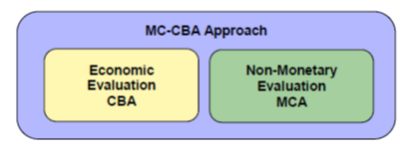Smart grid projects are responsible of wide range impacts, which span from the electrical power system to the entire society. In general, the investment projects are assessed with a Cost-Benefit Analysis (CBA), which requires quantifying the impacts for converting them in monetary terms. In the smart grid context, not all impacts are quantifiable and/or monetizable; therefore, the CBA lacks in describing completely the smart grid potential. With the aim to outclass the CBA shortcomings, this discussion paper proposes to integrate the CBA into a Multi-Criteria Analysis (MCA) framework. The combined approach preserves the strengths of both CBA and MCA and identifies the best alternative according to its monetary and non-monetary performances. Furthermore, the stakeholders’ point of view is directly collected and the preferences are explicitly related to the decision-making problem under analysis. To achieve a common smart grid assessment framework, the MC-CBA methodology relies on acknowledged guidelines on project analysis. The assessment approach described in this report decomposes the decision-problem by analysing the impacts in three main areas: the economic area, the smart grid development merit area, and the externalities area. The MC-CBA methodology helps the decision maker identify the best smart grid investment option; the final aim is to provide a reliable support tool for orienting effectively the investments and the regulatory policies on smart grids.
